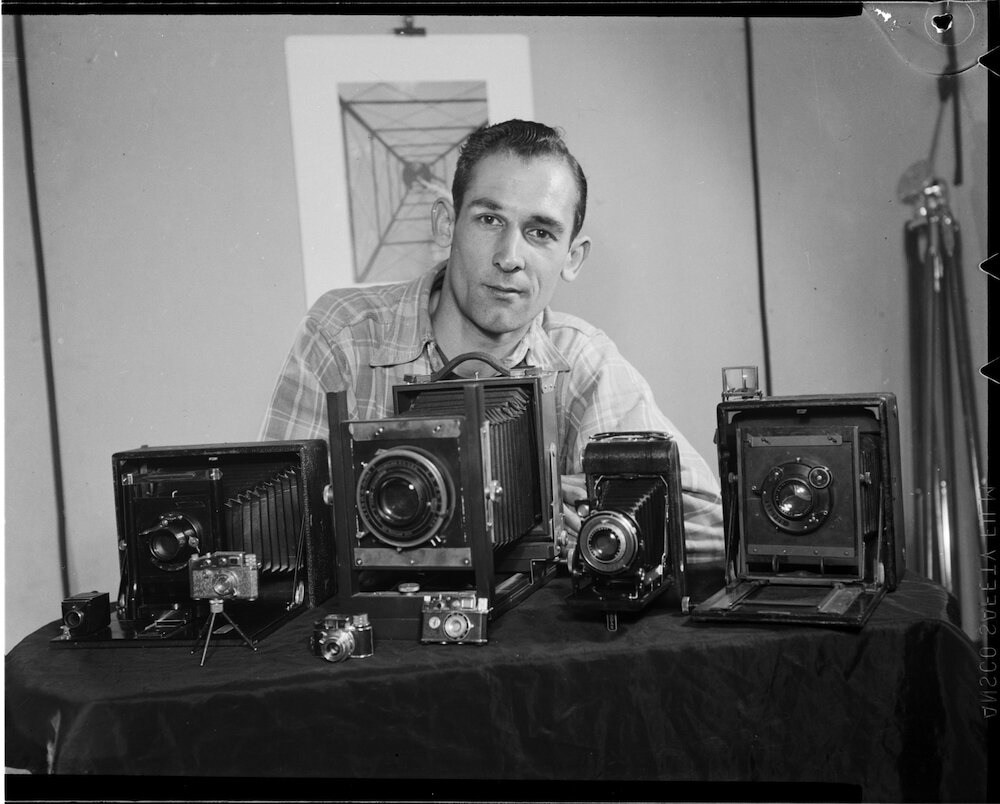DWIGHT CORE COLLECTION
Photograph: Dwight Core with several of his film cameras, circa 1940s. Courtesy George Ingmire. Image subject to copyright laws.
CONSERVATION & CAPTURE
Grant year: 2020
Grant category: Al Larvick National Grant
Grant recipient: George Ingmire
Collection title: Dwight Core Collection
Primary maker(s): Dwight Core
Original format: 16mm and 8mm film, black and white, color, silent
Circa: 1940s - 1970s
Collection size: Approximately 9,500ft, 18 reels of films; photographs; cameras and camera equipment
Grant support: Cleaning and repair and digital capture of approximately 5000ft of the overall film collection
Digital capture format: Scanned at 2k resolution
Lab: Pro8mm
Status: Conservation and digitization completed
Online Access: Coming soon
Creative Commons License: Attribution-NonCommercial-ShareAlike 4.0 International: http://creativecommons.org/licenses/by/4.0/
grantee
Photograph: George Ingmire, 2018. Courtesy George Ingmire. Image subject to copyright laws.
George Ingmire has been a media producer in radio and film since 1999. He holds a B.A. in anthropology and a M.F.A. in film production, both from the University of New Orleans. He hosted the “New Orleans Music Show" on WWOZ for close to 20 years and produced nationally syndicated radio programs, “New Orleans Calling” and “New Orleans All the Way Live”, about the music, food and culture. Currently, he’s the producer of “The Reading Life” with Susan Larson at WWNO, an NPR station in the New Orleans area.
In film, he has worked as a sound recordist in New Orleans, as well as Haiti, Peru, Bahamas, Mexico and Columbia, for directors who include Spike Lee, Barbara Kopple and Harry Shearer. His work in film post-production includes Think of Me First as a Person, an eight-minute documentary about his uncle Dwight Core, Jr., originally filmed on 16mm by his maternal grandfather, Dwight L. Core, and restored by Ingmire in 2006. At the time of writing, Ingmire is working on a feature length documentary, featuring over fifty years of his grandfather’s films and photographs; and interview with Dwight Core’s four daughters.
Photograph: Dwight Core Family, circa 1950s. Courtesy George Ingmire. Image subject to copyright laws.
FILMMAKER
Photograph: Dwight Core, circa 1950s. Courtesy George Ingmire, Image subject to copyright laws.
Dwight L. Core (1921 - 1995) was a native of Carlisle, West Virginia. After serving in the Air Force in World War II, he worked as a photographer with the Naval Supply Center in Norfolk, Virginia. He raised 4 girls and a boy (the subject of ‘Think of Me First as a Person) with his wife, Shirley Core. Starting in the 1940s, he made numerous amatuer films on 8mm and 16mm, including home movies, murder mysteries and nature documentaries. In addition to his love of filmmaking, he played a number of musical instruments, including the violin, trumpet, and organ.
His film (Think of Me First as a Person) - about his son, Dwight Core, Jr., who was born in 1960 with Down Syndrome - was added to the National Film Registry in 2006 and was described by Mike Mashon (Library of Congress) as “a beautifully edited, poetic expression...a transcendent home movie.” Until his death in 1995, Dwight Core continued to produce films and videos about numerous subjects, ranging from his birthplace in West Virginia to documentaries about other family members.
16mm still image. Silkworms by Dwight Core on the life cycle of silkworms, circa early 1960s. Courtesy George Ingmire. Image subject to copyright laws.
COLLECTION
16mm still image: Think of Me First as a Person by Dwight Core, (restored by George Ingmire), circa mid-1960s. Named to the National Film Registry in 2006. Courtesy George Ingmire. Image subject to copyright laws.
The Dwight Core Collection consists of home movies and amateur films in color, black and white, and were shot by my grandfather, Dwight L. Core. There are some reels of my Uncle Dwight as a child, who was born in 1960 with Down Syndrome. My grandfather’s film, ‘Think of Me First as a Person’, about his son, Dwight, is now on the National Film Registry (2006). There 4 ‘murder mysteries’ shot in the late 1940s/early 1950s, based on Sam Spade and Edgar Allen Poe stories; Various nature films (insects/ wildlife/ the life cycle of silkworms); the beachfront of Ocean View (Norfolk, Va.) and Ocean View amusement park; graduations in the 1960s (high school, nursing school); family gatherings (1950s - 60s) in Norfolk - Christmas, Easter, birthday parties, cookouts; early years of grandparents and their children in Paxton, Illinois (1940s/50s); a road trip to West Virginia; a live performance (music, clowns, a poodle pushing a baby carriage) at a special needs camp that my uncle Dwight attended; Chickens being inoculated where my grandfather worked on the farm as a young man; a Naval Supply Center in Norfolk, Virginia where my grandfather worked in a film lab.
The films involve my mother’s side of the family, comprised of my grandparents, their 5 children (4 girls, 1 boy), my great uncle Ike who participated in the ‘murder mysteries’, myself and my cousins, relatives in Norfolk (Virginia), Paxton (Illinois), various parts of West Virginia and Lynchburg (Virginia), where there was a facility for special needs children where my uncle Dwight lived.
These home movies document the ‘ordinary’ life of a middle-class American family from the late 1940s through the early 1970s.
16mm still image. The Death Card by Dwight Core, circa, late 1940s. A rare appearance in front of the camera. Courtesy George Ingmire. Image subject to copyright laws.







